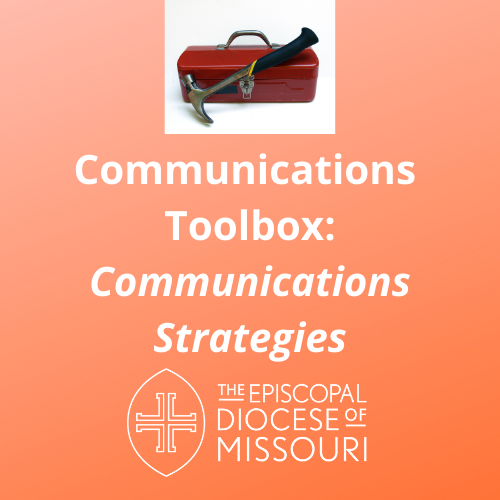Communications Toolbox: Building a Communications Strategy

by Janis Greenbaum,
Director of Communications,
The Episcopal Diocese of Missouri
The pandemic has forced us all to learn new ways to be the church, with communications and technology at the center of that forced education. Now that we've poured so much money and so many hours into our church communications, it's time to take a step back and really consider what our message is and how we should communicating.
Developing a communications strategy can help you make sense of your work and make your church communications more meaningful and effective.
A communications strategy is a plan for communicating with your audience. Your strategy is based on two simple ideas:
- Establish objectives (goals)
- Turn your objectives into actions (initiatives)
You can/should have both long-term and short-term objectives:
- Long-term objectives focus on your parish or ministry mission and vision
- Short-term objectives will focus on specific projects.
To achieve your objectives or goals, ask these simple questions to develop your initiatives:
- Who is your target audience?
Church members, church neighbors, children, adults, local business, etc. - What is your message?
What you stand for as a church community, come to church, volunteer for outreach, invite to an event, etc. Your message should always be an expression of your mission and vision. - How will that message be communicated?
Platforms: print, video, social media, newsletter, website, phone call, personal visit, etc. - What is the timeline?
When do you want your message to reach your audience? Set deadlines and do your best to stick to them. Consistency in communications is important. - Who will be responsible for the communications?
Name specific people and hold them responsible: communications director, parish administrator, clergy, volunteers, etc.
Once you have answered those questions, you will have a strategic communications plan. As with most things in the church world, flexibility will be key. But you will have a solid foundation and a direction to carry out your initiatives and ultimately reach your goals.
Please note: You may notice that everything depends on knowing and understanding your mission. If you don't have a defined mission statement, I encourage you to develop one!
Developing a strategic plan for your church communications will help you become more efficient, more accountable, and most importantly, will keep you focused on the real mission of your ministry.
This information was presented at our "First Fridays" event on Feb. 4, 2022.
Contact Janis Greenbaum if you would like to discuss a communications strategy for your parish or ministry.
Tags: News